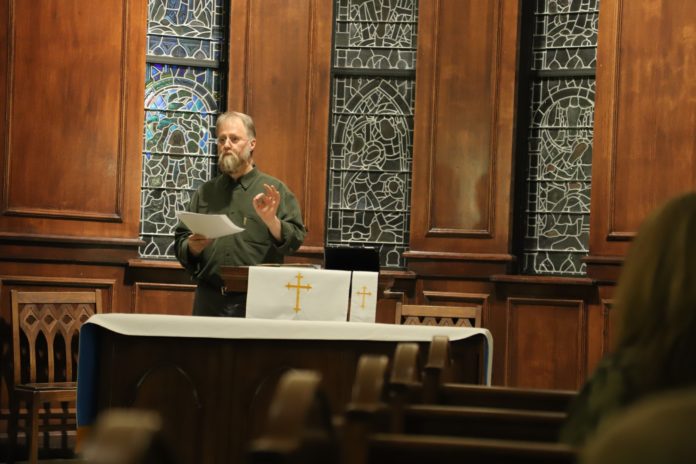By Matthew Muir | Staff Writer
Dr. Phillip Donnelly urged Christians to use the art of grammar to realign the message of prayer from a request of God to act to an invitation to enact God’s will.
Donnelly, the director of Baylor’s Great Texts Program, presented his lecture “The Grammar of Prayer” Friday night in Robbins Chapel. At the public lecture, Donnelly said a common misconception is that grammar is only rules and information.
“Rather than understanding grammar as either information or arbitrary judgements, we need to understand grammar as a verbal art,” Donnelly said. “That is, as a knowledge of how to make something using words. Grammar is about faithfulness between our words and reality.”
Combining a command of grammar with an understanding of prayer’s purpose, Donnelly said is the key to praying well.
“The question is not do you pray, the question is whether we pray well,” Donnelly said. “The purpose of prayer is not to get God to help us with our problems… Although the words of prayer are not the source of reality, our words can remind us about and lead us to what is real.”
To illustrate this, Donnelly Analyzed the Lord’s Prayer. For example, the first three lines including “hallowed be your name,” are specifically worded not as a request to God but rather an agreement with God and an “opportunity for recommendation.”
“I’m going to suggest to you that the purpose of prayer is, in a word, confession. Confession is, at the most basic level, means to say together, to agree,” Donnelly said. “To confess to God in this broader sense means in effect to agree with God by telling the truth about ourselves… We confess our condition not because God doesn’t know, instead in the very act of confessing we allow God to bring us to the truth of ourselves.”
Donnelly said the final three lines of the Lord’s Prayer, such as “give us this day our daily bread,” are worded in a way that “render[s] the action in a way that makes it not a direct action by God,” but still “confess our reliance on God.”
Germantown, Ma., Grad student Ryan Sinni said Donnelly’s characterization of prayer as telling the truth resonated with him.
“I was really struck by the part of the lecture where Dr. Donnelly describes prayer as telling the truth about our situation, about where we are in the world and about our need for God,” Sinni said. “What Dr. Donnelly is trying to get across is that grammar isn’t just about where we put our punctuation marks, it’s actually about telling the truth.”
Donnelly’s public lecture served as the key-note address for the Texas Alcuin Fellowship Retreat, a two-day workshop for classical Christian educators hosted by Baylor. Lesley-Anne Williams, a professor at LeTourneau University and 2004 Baylor graduate, said Donnelly’s lecture gave her a better understanding of her faith.
“It highlighted the way in which the liberal arts ought to be a living practice and living knowledge and it applied it to scripture in ways that made me personally understand how God works in the world better,” Williams said.






